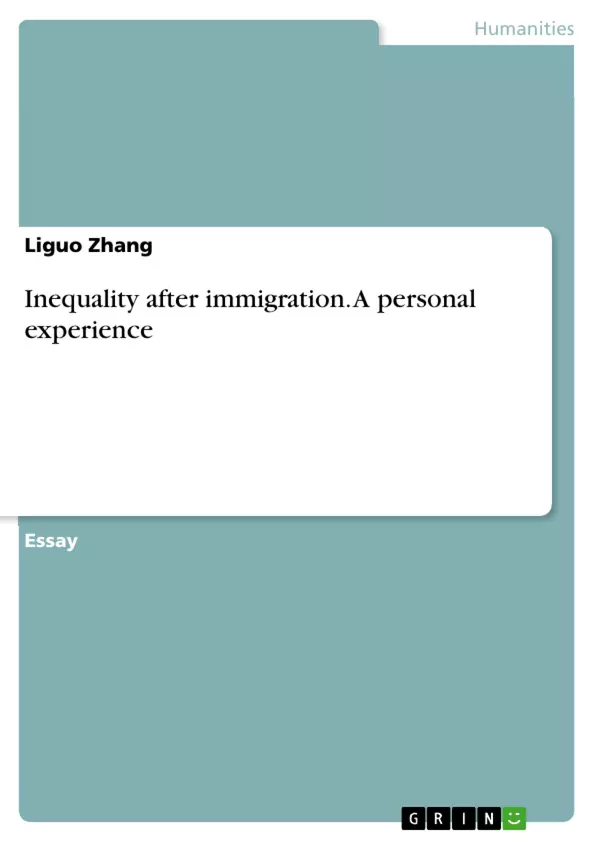After immigration, I feel people could hardly remember my Chinese name; I had to have an English name “John” for people in Toronto to call me conveniently. I am a Chinese citizen, non-religious, and heterosexual male. I am disadvantaged by my age, just stepped to fifty. I have a Bachelor of Art degree majoring in English language and literature in China. Before I immigrated to Canada in 2007, I had a career in business in China.
At my job and in my place in Chinese society, I benefited from privileges like never worrying about my race, being able to have a middle class standard of living and not having my competence questioned. Outside of work, my interests lied in learning languages: classical as well as modern Chinese and the English language.
However, things became quite different when my family and I landed in Toronto in 2007 as skilled immigrants. We lost all of our previous positions, friends, and connections in China. People here regarded me, my wife, and my son as new immigrants from China.
Inhaltsverzeichnis (Table of Contents)
- How I experience inequality after immigration
- My Chinese name and identity
- My experience as an assistant superintendent
- Globalization and inequality
- Learning about social work theory
- My future as a social worker
Zielsetzung und Themenschwerpunkte (Objectives and Key Themes)
This personal reflection explores the author's experiences with inequality after immigrating to Canada from China. It examines the challenges faced by immigrants, particularly those from visible minority groups, and analyzes the impact of globalization on social and economic inequalities.
- The experience of inequality after immigration
- The impact of globalization on social and economic inequalities
- The role of language and cultural identity in shaping experiences of inequality
- The importance of understanding and challenging social biases
- The potential for social work to address issues of inequality and injustice
Zusammenfassung der Kapitel (Chapter Summaries)
The author begins by describing the challenges he faced after arriving in Toronto, including a loss of social status, a significant decrease in purchasing power, and the difficulty of finding employment. He then recounts his experience working as an assistant superintendent, highlighting the wage disparity between him and his white counterparts, despite performing similar duties. The author also discusses his observations of racial discrimination within the building and the challenges of navigating unfamiliar cultural norms.
The author then reflects on the impact of globalization on global inequality, arguing that the free trade policies of institutions like the World Bank and WTO have negatively impacted developing nations, resulting in increased poverty and inequality. He further discusses how the dominance of large corporations undermines fair competition and limits the choices available to marginalized populations.
The author concludes by discussing his personal journey of learning about social work theory and its relevance to his experiences with inequality. He outlines his future aspirations as a social worker, emphasizing his commitment to working towards social justice and advocating for marginalized communities.
Schlüsselwörter (Keywords)
The main keywords and focus topics of this text include immigration, inequality, globalization, social work, visible minority, discrimination, cultural identity, social biases, and social justice.
Frequently Asked Questions
What are the common challenges faced by immigrants in Canada?
Immigrants often face a loss of social status, language barriers, identity struggles (such as changing names), and difficulties in finding employment that matches their previous qualifications.
How does globalization affect social inequality?
Globalization can exacerbate inequality through free trade policies that may disadvantage developing nations and by reinforcing the dominance of large corporations over marginalized populations.
What is "wage disparity" in the context of immigration?
It refers to the situation where immigrants, despite having similar duties and qualifications, are paid less than their local counterparts, often due to racial or cultural biases.
Why do some immigrants adopt English names?
Many immigrants choose English names to make communication easier for locals and to avoid the social friction caused by difficult-to-pronounce foreign names.
How can social work help address inequality?
Social work aims to challenge social biases, advocate for marginalized communities, and work towards social justice by understanding the structural roots of inequality.
- Quote paper
- Liguo Zhang (Author), 2013, Inequality after immigration. A personal experience, Munich, GRIN Verlag, https://www.grin.com/document/317172



